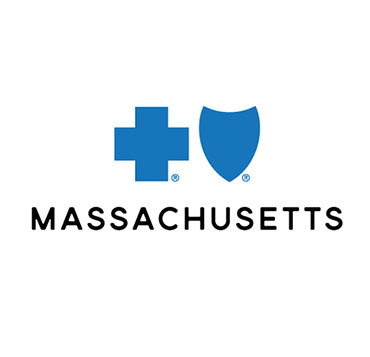BOSTON, June 29, 2017 /PRNewswire-USNewswire/ -- A new study from the Blue Cross Blue Shield Association (BCBSA) shows that Massachusetts is ahead of the nation when it comes to combatting the opioid epidemic. From prescription rates to treatment, Massachusetts fares better than most states and the national average.

According to the latest BCBSA Health of America report - America's Opioid Epidemic and its Impact on the Nation's Commercially-insured Population – which looks at claims data from Blue Cross Blue Shield members nationwide, 14% of Blue Cross Blue Shield members in Massachusetts filled an opioid prescription in 2015 compared to 21.4% nationally.
The report also found that opioid use disorder diagnoses soared almost 500% from 2010 to 2016 nationally, while the use of medication-assisted treatment did not keep pace – up just 65%. In Massachusetts, however, 84% of members diagnosed with opioid use disorder received medication-assisted treatment, the second highest rate in the nation behind Vermont. Medication-assisted Treatment, the combination of drug therapy and counseling, is one of the most effective therapies for this condition,
According to the report, prescriptions of high-dose, long-duration opioid-based medications are associated with higher rates of opioid disorder diagnoses. Here again, Massachusetts fared better than the nation. Just 2% of Blue Cross Blue Shield members in Massachusetts received a prescription for high-dose, long-duration opioid-based medications, the second lowest rate in the nation behind Minnesota, and far less than the national average of 8.3%.
Reducing the number of these high-dose, long-duration opioid-based medications was one of the key goals of the Blue Cross Blue Shield of Massachusetts Prescription Pain Medication Safety Program, introduced in 2012. This first-of-its-kind program significantly reduced the risk of opioid misuse by requiring:
- Prior authorization for all new short-acting opioid prescriptions for more than 30 days
- Prior authorization for all new long-acting opioid prescriptions
- A treatment plan between doctor and patient that considers non-narcotic options
- A risk assessment for addiction signed by the patient
- An opioid agreement between the patient and prescriber outlining expected behavior of both parties
In its first three years, the Prescription Pain Medication Safety Program eliminated more than 21 million doses of opioid-based medications. Additionally, the program became the model for legislative action by the Commonwealth of Massachusetts.
"The opioid epidemic remains one of the most critical health care issues of our time," said Bruce Nash, Chief Physician Executive, Blue Cross Blue Shield of Massachusetts. "Our health plan led an early and aggressive response to the issue of over prescription of opioid medications that has inspired action by others. This Health of America report indicates that together we may be having an impact. We will continue to look for innovative approaches to stem all forms of substance use disorder, but this is a community-wide problem that requires a community-based solution."
Blue Cross Blue Shield of Massachusetts has taken other definitive steps to help to address the opioid epidemic, including improving access to medication-assisted treatment for members. The company is also a founding member of RIZE Massachusetts. RIZE is an independent nonprofit organization that seeks to raise $50 million over the next three years to support innovative care that helps people with substance use disorders adhere to their treatment and maintain their recovery.
For more information about BCBS companies' local efforts to combat opioid misuse, visit https://bcbs.com/about-us/capabilities-initiatives/addressing-americas-opioid-addiction. Blue Cross Blue Shield of Massachusetts' Prescription Pain Medication Safety program is featured on this website.
This is the 13th study in the Health of America Report® series, a collaboration between BCBSA and Blue Health Intelligence, which uses a market-leading claims database to uncover key trends and insights into health care affordability and access to care.
About Blue Cross Blue Shield of Massachusetts
Blue Cross Blue Shield of Massachusetts (bluecrossma.com) is a community-focused, tax-paying, not–for–profit health plan headquartered in Boston. We're the trusted health plan for more than 25,000 Massachusetts employers and are committed to working with others in a spirit of shared responsibility to make quality health care affordable. Consistent with our corporate promise to always put our 2.8 million members first, we're rated among the nation's best health plans for member satisfaction and quality. Connect with us on Facebook, Twitter, YouTube, and LinkedIn.
About Blue Cross Blue Shield Association
The Blue Cross and Blue Shield Association is a national federation of 36 independent, community-based and locally-operated Blue Cross and Blue Shield companies that collectively provide healthcare coverage for one-in-three Americans. BCBSA provides health care insights through The Health of America Report series and the national BCBS Health Indexsm. For more information on BCBSA and its member companies, please visit bcbs.com. We also encourage you to connect with us on Facebook, check out our videos on YouTube, follow us on Twitter and check out The BCBS Blog.
About Blue Health Intelligence
Health Intelligence Company is the nation's premier health intelligence resource, delivering data-driven insights about healthcare trends and best practices, resulting in healthier lives and more affordable access to safe and effective care. HIC accesses healthcare claims data from more than 140 million individuals nationwide, collected over nine years, in a safe, HIPAA compliant and secure database. The resulting conformed, reliable data set has the broadest, deepest pool of integrated medical and pharmacy claims, reflecting medical utilization in every ZIP code. Health Intelligence Company, LLC operates under the trade name Blue Health Intelligence (BHI) and is an Independent Licensee of BCBSA. For more information, visit http://www.bluehealthintelligence.com/.
SOURCE Blue Cross Blue Shield of Massachusetts
